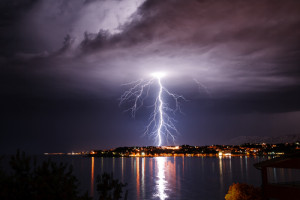
Meteorology is the study of Earth’s atmosphere. If you have a passion for clouds, thunderstorms, snow blizzards, and other weather conditions, then consider earning a degree in meteorology. You can do much more than just predict the weather with a meteorology degree. This article explores some of the different areas of meteorology as well as just a few career options available to people who have earned degrees in meteorology.
Exploring Meteorology
Meteorology can be broken down into a few subcategories, or more specific areas of study. Taking a closer look at these subcategories may help you better understand what meteorology majors study in school and apply to their careers upon earning degrees in meteorology.
Microscale Meteorology
Microscale meteorology brings together the study of mathematics, chemistry, and physics in order to learn how to track air pollutants and how those pollutants affect the physical properties of small areas. The weather phenomena studied in microscale meteorology typically last less than a day. Microscale meteorology can be helpful in the agricultural industry, as most of what is studied is close to Earth’s surface, including soil and vegetation.
Mesoscale Meteorology
Mesoscale meteorology involves the observation of current weather and weather patterns in layers of Earth’s atmosphere, including the troposphere, tropopause, and stratosphere. Examples of weather studied in these atmospheric layers include events such as thunderstorms, squall lines, fronts, and land breezes. These weather patterns are often studied throughout their life cycles.
Synoptic Scale Meteorology
Synoptic scale meteorology involves the study of the paths and patterns of high and low pressure systems and may include the study of weather conditions created by these systems. Low pressure systems can cause cyclones which may or may not turn into hurricanes, and high pressure systems often bring cloudless skies and, in turn, dry air.
Global Scale Meteorology
Global scale meteorology focuses on the study of weather patterns that travel from the poles to the tropics or from the tropics to the poles. The study of global scale meteorology includes the transfer of heat across the surface of Earth, also known as global atmospheric circulation. This particular subcategory of meteorology helps weather forecasters determine trade wind conditions and also often ties in mesoscale and synoptic scale meteorology.
Meteorology Degree Programs
If you find the subject of meteorology particularly electrifying, then discuss with your guidance counselor ways in which you can prepare for further study after high school. He or she can suggest courses for you to take during your junior and/or senior year that will help you get a good grasp on the concepts of meteorology before setting foot on a college campus. You should start applying to colleges and universities to study meteorology in the beginning of your senior year of high school. If you’ve already graduated high school and your current schedule makes it difficult for you to take the traditional route, consider earning your meteorology degree online.
Located in San Antonio, Texas, the University of the Incarnate Word is a private Catholic school with a meteorology department that offers students the opportunity to earn a Bachelor of Science in Meteorology or a Bachelor of Science in Broadcast Meteorology. These meteorology degree programs aim to educate students on how and why various weather phenomena occur. Students learn how identify and analyze factors that contribute to weather patterns and phenomena present in small regions and on a global scale while receiving a rounded education in liberal arts. The programs are designed to teach students about identifying and addressing issues in regard to air pollution and other weather conditions influenced by man, as well.
The University of Reading offers outstanding meteorology programs for undergraduate and graduate students alike, noting that the Department of Meteorology is one of the world’s leading centers for both teaching and research in the meteorology industry. In addition to all there is to learn in meteorology, the school also offers excellent extracurricular activities including a weather-themed photography competition within the department, games in which students and experienced faculty can compete with one another to accurately predict weather forecasts around the world, and discussions on weekly topical weather and climate issues. These activities and more are meant to increase interest in meteorology by encouraging students to participate in events relevant to their field, which may also help build experience and communication skills necessary for success in the working world.
Plymouth State University in New Hampshire offers a Bachelor of Science in Meteorology for undergraduate students. This degree program incorporates courses in various forms of science and mathematics in order to give students valuable educational experiences that will benefit them in their future careers. Most classes required for the completion of the meteorology program consist of between 15 and 35 students so that students are able to receive the attention and dedication they deserve from experienced and highly knowledgeable educators. Internships are also available for students looking to go above and beyond in order to gain hands-on experience, which may help them achieve more advanced careers. Plymouth State University also offers a Master of Science in Applied Meteorology for students looking to further their education after earning a bachelors degree.
Careers in Meteorology
Studying meteorology isn’t just for someone who wants to broadcast the daily weather forecast over the television or radio. The study of meteorology is useful to many different industries for various reasons. While you’re enrolled in a meteorology program at an accredited college or university, you should also spend time considering career options that will become available to you once you’ve completed your degree program. Choosing a career path while still in college can help you focus on taking courses that will benefit your future in that particular career.
*Note: The Bureau of Labor Statistics groups all meteorologists and atmospheric scientists together, and the website states that the median annual salary for this group was just over $89,000 in 2012.
Forensic Meteorologist

A forensic meteorologist may assist with investigations by using computer programs to reconstruct previous weather patterns in order to demonstrate how the weather may have been a contributing factor to crimes or damage that took place at certain times. Reconstructed weather conditions may include anything from thunderstorms to air pollution in defense of damage done by winds, flooding, or other natural causes. Forensic meteorologists may enter the field with bachelor degrees in anything from meteorology to chemistry to even electrical engineering, although advanced degrees like a masters in meteorology are particularly beneficial. These meteorologists have particularly keen analytical and computer skills, as well.
Physical Meteorologist
A physical meteorologist observes both the physical and chemical properties within the atmosphere, allowing him or her to learn how light, sound, and radio waves are transmitted through the atmosphere. A physical meteorologist then uses this information to determine how energy is being transferred in the atmosphere and how it is linked to the creation of various weather conditions. Physical meteorologists are very inquisitive and possess bachelor degrees in meteorology or other related fields. These meteorologists are not directly involved in the broadcasting of weather forecasts.
Atmospheric Meteorologist
An atmospheric meteorologist analyzes how the environment is affected by the physical properties of Earth’s atmosphere in order to identify and further analyze weather patterns. They may also present weather forecasts to the public via television or radio broadcasting. Broadcast meteorologists also post weather updates on social media sites and news websites, as well. They possess advanced knowledge in the use of computer programs used for the identification and analysis of weather conditions. An atmospheric meteorologist also has at least a bachelors degree in meteorology.
Environmental Meteorologist
An environmental meteorologist studies air quality of a specific area in an effort to determine ways to better care for the environment. Environmental meteorologists are often concerned with reducing air pollution and ozone depletion. They also use their observations to find ways to address and handle global warming issues. Environmental meteorologists possess bachelor degrees in meteorology, environmental science, or other related fields and have a passion for preserving and bettering the environment.
Synoptic Meteorologist
A synoptic meteorologist often works as part of a team of meteorologists to predict and monitor severe weather conditions such as tornadoes, hurricanes, and blizzards. Synoptic meteorologists also spend much of their time using computer programs to design and develop new weather-predicting technology and/or improving existing tools used for predicting various types of weather conditions. A synoptic meteorologist possesses a bachelors degree in meteorology with a strong background in computer technology and mathematics. He or she may also possess a higher degree, such as a masters in meteorology.
Companies that Hire People with Meteorology Degrees
Companies across the globe are looking for people with meteorology degrees regularly. Below is just a brief list of places who hire people with various levels of degrees in meteorology.
TrueLight Energy – headquarters in Boston, MA; hires positions for energy trading analysts, etc.
AccuWeather, Inc. – headquarters in State College, PA; hires positions for storm warning meteorologists, radio broadcasters, network operations center technicians, etc.
Fairfield Technologies, Inc. – locations across the US; hires positions for meteorologists, technical support analysts, software test engineers, etc.
Syneren Technologies Corporation – offices in VA and MD; hires positions for tsunami subject matter experts, meteorologists, meteorology systems engineers, etc.
Meteorology is an industry that will never become extinct. The human race relies and always will rely on those educated in the field of meteorology for weather condition predictions, so jobs for people with meteorology degrees will always exist.
If you are interested in meteorology, you may be interested in other jobs related to climate change as well.



Pingback: What Does A Job As A Meteoroligist Entail? - My Blog
Pingback: What Can I Do With My Bachelors Degree In Anthropology | Tiriya1
Pingback: Dietetics Degree Kings | cj